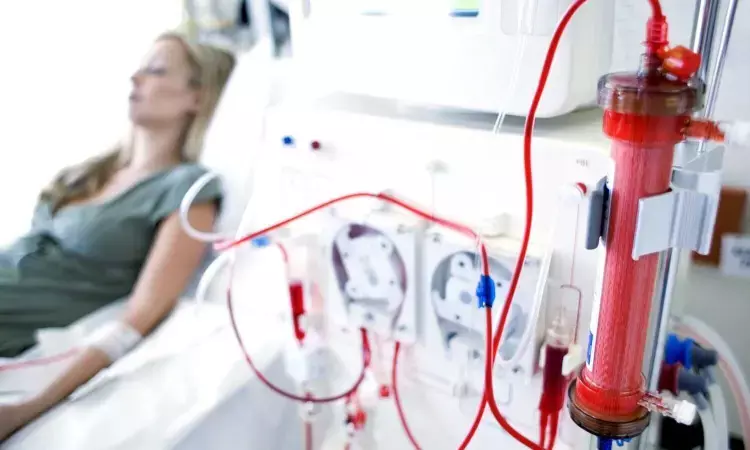- Home
- Medical news & Guidelines
- Anesthesiology
- Cardiology and CTVS
- Critical Care
- Dentistry
- Dermatology
- Diabetes and Endocrinology
- ENT
- Gastroenterology
- Medicine
- Nephrology
- Neurology
- Obstretics-Gynaecology
- Oncology
- Ophthalmology
- Orthopaedics
- Pediatrics-Neonatology
- Psychiatry
- Pulmonology
- Radiology
- Surgery
- Urology
- Laboratory Medicine
- Diet
- Nursing
- Paramedical
- Physiotherapy
- Health news
- Fact Check
- Bone Health Fact Check
- Brain Health Fact Check
- Cancer Related Fact Check
- Child Care Fact Check
- Dental and oral health fact check
- Diabetes and metabolic health fact check
- Diet and Nutrition Fact Check
- Eye and ENT Care Fact Check
- Fitness fact check
- Gut health fact check
- Heart health fact check
- Kidney health fact check
- Medical education fact check
- Men's health fact check
- Respiratory fact check
- Skin and hair care fact check
- Vaccine and Immunization fact check
- Women's health fact check
- AYUSH
- State News
- Andaman and Nicobar Islands
- Andhra Pradesh
- Arunachal Pradesh
- Assam
- Bihar
- Chandigarh
- Chattisgarh
- Dadra and Nagar Haveli
- Daman and Diu
- Delhi
- Goa
- Gujarat
- Haryana
- Himachal Pradesh
- Jammu & Kashmir
- Jharkhand
- Karnataka
- Kerala
- Ladakh
- Lakshadweep
- Madhya Pradesh
- Maharashtra
- Manipur
- Meghalaya
- Mizoram
- Nagaland
- Odisha
- Puducherry
- Punjab
- Rajasthan
- Sikkim
- Tamil Nadu
- Telangana
- Tripura
- Uttar Pradesh
- Uttrakhand
- West Bengal
- Medical Education
- Industry
Vascular access status strongly linked with demoralization syndrome in Elderly maintenance hemodialysis Patients: Study

Researchers have found a strong correlation between vascular access status (VAS) and demoralization syndrome (DS) in elderly maintenance hemodialysis (MHD) patients in a new study. Further enhancing social support, managing anemia, and regulating mineral metabolism may improve vascular access outcomes, reduce demoralization, and enhance overall quality of life. The study was conducted by Xiangying Lv and fellow researchers. The study was published in BMC Nephrology.
Vascular access is the lifeblood of hemodialysis patients. Yet, VA complication, pain, and functional impairment can impact not only physical well-being, but emotional resilience as well. Demoralization syndrome—a psychological condition characterized by helplessness, hopelessness, and loss of purpose—is particularly common in older MHD patients, yet its relationship to VA satisfaction has not been well researched.
This research, carried out from April 2024 to October 2024, sought to fill this gap by assessing the relationship between satisfaction with vascular access (VAS) and demoralization among a sample of 350 older MHD patients. With the use of trusted instruments—the Short Form Vascular Access Questionnaire (VAQ) and the Chinese Version of the Demoralization Syndrome Scale—the research provides new information on how bodily treatment experiences affect mental health outcomes.
Participants were recruited from three tertiary hospitals and consisted of patients 60 years and older who were on long-term hemodialysis. Patients were classified into two groups according to their vascular access satisfaction scores:
VA dissatisfaction group (n = 220)
VA satisfaction group (n = 130)
Data gathered consisted of social demographics, laboratory values (hemoglobin and PTH levels), and the duration of dialysis. Binary logistic regression models were employed to determine independent predictors of dissatisfaction with vascular access, while independent t-tests were utilized to compare between the two groups the demoralization syndrome scores.
Results
• The comparison revealed a substantial difference in DS scores between the low and high VA satisfaction patients.
• The average DS score for the VA dissatisfaction group was 73.6 ± 8.7, whereas it was 51.2 ± 6.9 in the VA satisfaction group (p < 0.01), strongly reflecting increased psychological distress among those dissatisfied with their vascular access.
Multivariate logistic regression identified several independent risk factors for VA dissatisfaction:
• Solitary living made dissatisfaction more likely (OR = 2.1; 95% CI, 1.4–3.2).
• Increased dialysis time was also an independent predictor (OR = 1.8; 95% CI, 1.2–2.7).
• Higher PTH levels were associated with more dissatisfaction (OR = 1.5; 95% CI, 1.1–2.0).
• Higher hemoglobin levels, on the other hand, was a protective factor (OR = 0.6; 95% CI, 0.4–0.9), indicating that adequately treated anemia can be a factor in better patient satisfaction with vascular access.
This study finds a strong and clinically relevant correlation between satisfaction with vascular access and demoralization syndrome among elderly hemodialysis patients. Interventions for anemia, control of PTH, and social isolation alone or living with others can increase satisfaction and reduce psychological distress. These modifiable risk factors offer the opportunity for multidisciplinary teams to include vascular access assessments and emotional well-being screening in regular MHD treatment to achieve improved patient quality of life.
Reference:
Lv, X., Zhang, H., Yang, L. et al. Correlation between vascular access satisfaction and demoralization syndrome in elderly patients with maintenance hemodialysis: a multi-center study. BMC Nephrol 26, 265 (2025). https://doi.org/10.1186/s12882-025-04191-3
Dr Riya Dave has completed dentistry from Gujarat University in 2022. She is a dentist and accomplished medical and scientific writer known for her commitment to bridging the gap between clinical expertise and accessible healthcare information. She has been actively involved in writing blogs related to health and wellness.
Dr Kamal Kant Kohli-MBBS, DTCD- a chest specialist with more than 30 years of practice and a flair for writing clinical articles, Dr Kamal Kant Kohli joined Medical Dialogues as a Chief Editor of Medical News. Besides writing articles, as an editor, he proofreads and verifies all the medical content published on Medical Dialogues including those coming from journals, studies,medical conferences,guidelines etc. Email: drkohli@medicaldialogues.in. Contact no. 011-43720751


